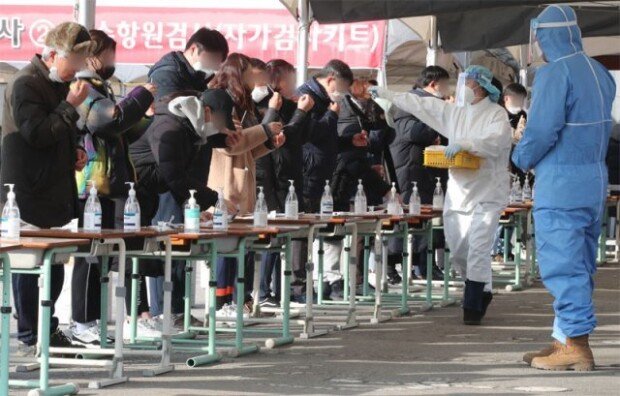Daily confirmed COVID-19 cases triple in a week
Daily confirmed COVID-19 cases triple in a week
Posted February. 09, 2022 08:01,
Updated February. 09, 2022 08:01

An increase in the number of daily confirmed COVID-19 cases is overloading the virus’ diagnostic procedures. Concerns are raised that the number of PCR tests that can be taken in a day will significantly decrease as more people are confirmed to have been infected with COVID-19. Some say that rapid antigen tests using a COVID-19 self-diagnostic kit that have recently been introduced to triage rooms in preparation for an increase in infections are causing confusion contrary to the intended purpose.
The Korea Disease Control and Prevention Agency (KDCA) announced on Tuesday that COVID-19 daily cases have accounted for 30.7% of the total tests taken, translating into one in every three people visiting triage rooms to be tested for COVID-19. The share of COVID-19 test results found positive declined to the 1% level in January, then exceeded 10% on Feb. 3 for the first time and has been increasing ever since.
Experts in the heath authority assess that a spike in the number of people tested positive for COVID-19 makes it difficult to carry on with the existing sample analysis method. At present, South Korea uses pooled sample testing method, which combine pool of specimens (five samples) to screen symptomatic individuals. While pooling techniques are effective when test positivity is low, in a case where test positivity exceeds 20%, it is highly likely that the combined pool of specimens is found positive for COVID-19, and all samples have to be tested again to identify which sample has been tested positive.
Health workers in the field say that the number of daily tests have declined, with worsening confusion. A health worker in a triage room at Seoul Plaza in downtown Seoul said that as many as 2,000 people got tests for COVID-19 before a change took place with regard to testing for COVID-19, but only 1,300 to 1,400 people get tests for COVID-19 at present. “Testing overload happens while awaiting the results from self-tests using COVID-19 self-diagnostic kits,” the health worker said.
asap@donga.com
Headline News
- Korean business leaders urge a halt to commercial law amendment
- Yoon begins extensive verification for cabinet and staff reshuffle
- Police confirm Pyongyang’s involvement in Ether heist in 2019
- Ukraine fires British Storm Shadows at targets on Russian territory
- Ulsan and Pohang compete to crown Korea’s soccer champions







